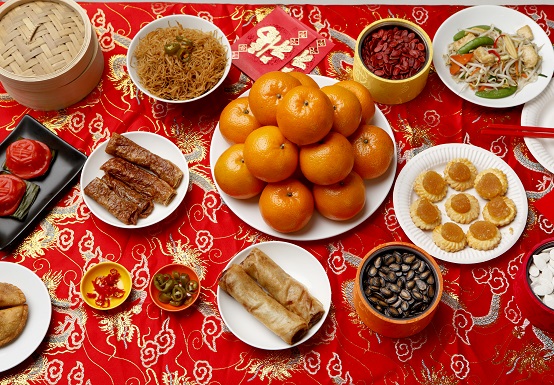
The double whammy of Christmas and Chinese New Year probably left many readers with an
‘abundance’ in all the wrong places. Fret not. Jacqueline Loh, Dietitian, Mount Alvernia Hospital, shares
sound strategies to aid recovery from the recent festivities and easy hacks to help you scale down the
toll of future ones.
EASY TO GAIN, HARD TO SHED
Over the festive season, it becomes harder to watch what we eat as we run from one gathering to the next with families and friends. While it is perfectly acceptable to enjoy a festive meal for a special occasion, the idea of prolonged festive feasting is not a healthy one.
Studies have shown that the weight gained during short festive periods is unlikely to be shed over the course of a year. Having an overweight BMI (>22.9kg/m2) is a risk factor for comorbidities – the presence of one or more additional diseases or disorders co-occurring with a primary disease or disorder such as type 2 diabetes mellitus, hypertension, dyslipidemia, cardiovascular disease and stroke.
On the other hand, sudden calorie-cutting in a bid to shed weight gained during the festive season is also unhealthy. Weight fluctuations have been associated with an increased risk of cardiovascular problems in people with pre-existing comorbidities.
A YEAR-ROUND STRATEGY
So, eating with gluttonous abandonment during festive seasons followed by drastic dieting is a bad idea. Resigning yourself to permanent weight gain is avoiding a problem that will only get worse. So, short of cancelling Christmas and Chinese New Year, what can be done to minimise weight gain during the festive periods?
Obviously, eating a healthy balanced diet all year round helps. You should aim to eat plenty of nutrient-dense foods to support your immune system, energy levels and metabolism. If you develop a habit of healthy eating, the chance of major lapses during festive celebrations will be less likely. Or at the very least, they are more likely to be confined to one-off occurrences.
Given a choice, be it on a normal day of the year or a special occasion, you should always opt for fresh foods over processed foods. For example, choose a noodle soup dish and fresh fruit over fast food and potato chips. Go light on the gravies and sauces, limit alcohol intake and stay away from sugary juices and sodas.
FITNESS FIGHTS FATNESS
Year-round regular exercise is also important. Since the frequency of exercise tends to decrease over the holidays, thus making it easier to put on weight, it’s important to get back to your fitness routine as soon as possible.
Health Promotion Board recommends aiming for 150 minutes of physical activity per week. However, some physical activity is better than none, so do not be discouraged if you are finding it hard to fit in the full 150 minutes of exercise. Build physical activity into your day by taking the stairs as often as possible, cleaning the house, washing your car or going for a walk after dinner.
Eat well and in moderation all year round, exercise regularly, and plan ahead for the temptation-laden festive periods. Above all, enjoy yourself and maintain a healthy relationship with food and with your body.
PLAN AHEAD
Jacqueline shares some simple hacks for avoiding festive fat traps. You can apply this sage advice to all special occasions, from birthday parties to housewarmings to festive gatherings.
PACE YOURSELF
Since chances are you are familiar with the pattern of the festive seasons, next year you should aim to prioritise the days you want to indulge – for example, on the eve and first day of Chinese New Year. Confine your indulgence to those days, and eat carefully in between.
KNOW YOUR SNACKER PROFILE
If you struggle to resist going back for seconds, not to mention third and fourth helpings of your favourite dishes, opt for lower calorie snacks instead. If mindless munching is more your style, consciously take smaller bites and chew slowly. If you are more of an all-or-nothing snacker, choose your favourite snacks and eat a controlled portion of those whilst limiting other snacks.
KEEP YOUR DISTANCE
Although every gracious host will ply you with an abundance of food, where you position yourself is important. You are more likely to reach for that piece of bak kwa if you are sitting right in front of it. If you have hit your snack quota for the day, position yourself as far away from the snacks as possible. Holding a drink in your dominant hand can also prevent itchy fingers from picking fingerfood that may be passed your way.
STAY HYDRATED
Taking sips of water between mouthfuls of food not only helps to keep you hydrated but can also curb the temptation of tucking into tidbits and over-indulging on festive dishes.
DECLINE FOOD GRACIOUSLY
Declining food when, say, your favourite aunty pushes her famous homemade pineapple tarts on you, can be tricky. In these tricky situations, honesty is the best policy. Telling the host that you have already had a heavy meal is usually an acceptable reason. However, if you are unable to decline graciously, consciously limit the portions that you eat.
NEVER HOLD AN EMPTY PLATE
Since food offers are more likely to be forthcoming when your plate is empty, make sure that there is always food on your plate, and eat slowly and mindfully.
This article is contributed by Jacqueline Loh, Dietitian at Mount Alvernia Hospital. To learn more about our Nutrition and Dietitian services, click here
This article is taken from our My Alvernia Magazine Issue #37. Click here to read the issue on our website or on Magzter.